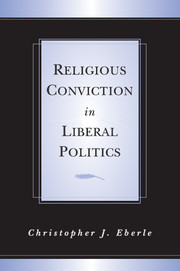1 - Religion and Responsible Citizenship
Published online by Cambridge University Press: 18 December 2009
Summary
INTRODUCTION
On November 3, 1992, citizens in Colorado voted on a proposed amendment to that state's constitution, “Amendment 2.” Had it been successfully enacted, Amendment 2 would have repealed existing laws in Denver, Boulder, and Aspen that prohibit work- and housing-related discrimination against homosexual citizens and would have forbidden the passage of any comparable law elsewhere in the state. Although Amendment 2 was passed by roughly 53 percent of voting citizens, it was eventually struck down by the Supreme Court in 1996 on the grounds that it violated the Equal Protection Clause. The failure of Amendment 2 to pass the scrutiny of Supreme Court has not, of course, quelled any of the controversies regarding the legal status of citizens who adhere to gay, lesbian, and bisexual lifestyles. If anything, we can expect legal and moral issues regarding homosexuality to assume an even more prominent profile in American politics in the near future.
The referendum on Amendment 2 raises all sorts of important questions. Not the least of those questions has to do with the moral merits of Amendment 2: are laws that forbid discrimination against gay, lesbian, and bisexual citizens morally appropriate? Is it morally appropriate for the state to force a landlord who believes that homosexuality is an abomination to rent an apartment to homosexual applicants? Or, as advocates of Amendment 2 held, should the state refrain from employing its coercive power to discourage discrimination against homosexual citizens, given that many citizens believe themselves to be morally obliged so to discriminate?
- Type
- Chapter
- Information
- Religious Conviction in Liberal Politics , pp. 3 - 22Publisher: Cambridge University PressPrint publication year: 2002



